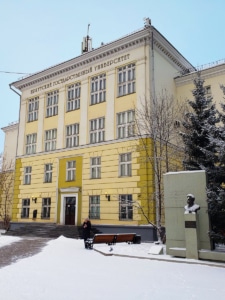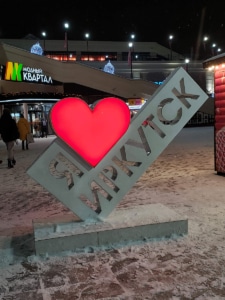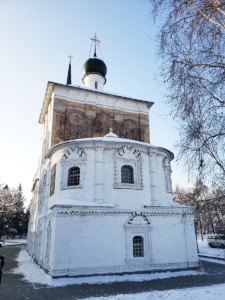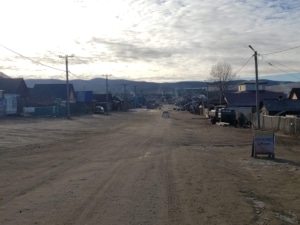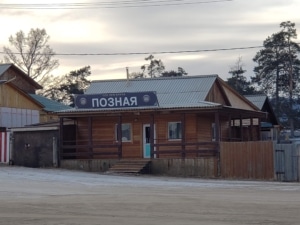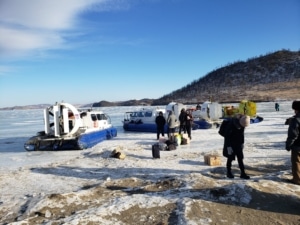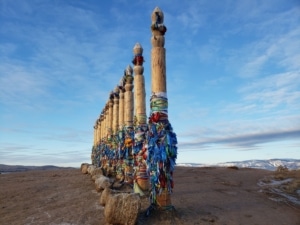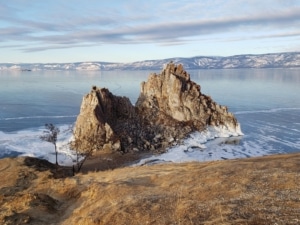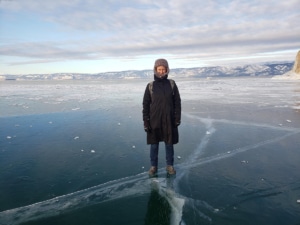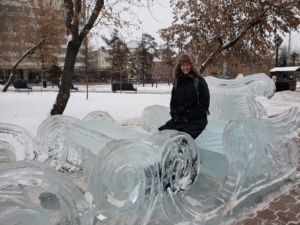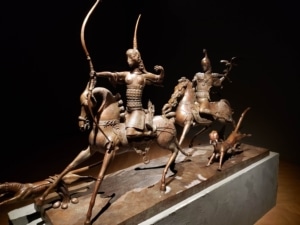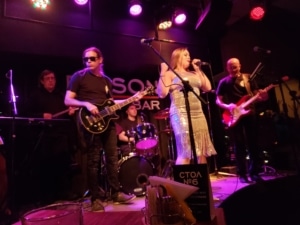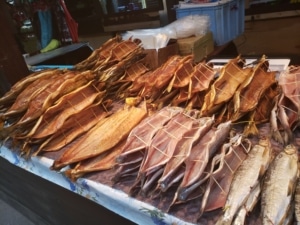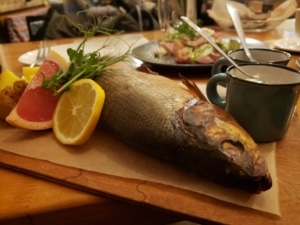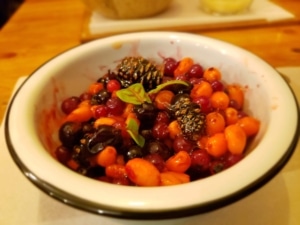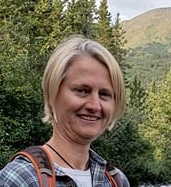There were a couple of things I really wanted to do for the SRAS 25th anniversary. One was to spend time on Lake Baikal, exploring places I’d never had time for in my shorter visits. The other was to take intensive Russian language classes abroad, especially as I had not had as much time exposed to the Russian language in the past year and a half.
I took 13 days to make sure I could fit my main objectives. As a high-energy traveler, I also packed in as many other experiences as possible. I had over 40 hours of class – a blend of language study and topical lectures on the region meant to mirror what our students experience on our Language and the Environment program.
I also had excursions in Irkutsk and to Lake Baikal, including to Olkhon Island, all with a Russian-speaking guide. I also stayed active getting out in the city, shopping at the market, and visiting local restaurants and bars. This was all in January, meaning short days and cold weather, so just walking around leisurely was not the temptation it would be in the warmer season.
Language Immersion
We have always promoted Irkutsk as a very immersive location for Russian language learning. Not only are there fewer English speakers, but there is a genuine curiosity and interest in foreigners, especially Americans, who are much rarer here than in our other locations. Plus, life moves at a slower pace in Siberia, there is time for human interaction. This is the heartland of Russia, very much like we describe the Midwest in the US. Most of our students in Irkutsk stay with host families, who are genuinely interested in the interaction with their guests. This all lends itself to spontaneous conversation opportunities.
My Russian lessons also gave me the opportunity to experience what our students do in the classroom, to understand some of the challenges they face. I learned most of my Russian while living and working in Moscow for five years in the 90s. Thus, I had learned in a somewhat non-traditional way, with very little of it in a classroom setting, and most of it on the street or in the office.
Learning like this can be effective, but also perhaps more likely to leave gaps. In my case, this gap was verbs of motion. It seems as if nearly everything else I managed to absorb, for the most part correctly, over years of exposure to the language. But those verbs of motion … . I understand now why so much effort is given to trying to figure out a good way to teach them. Just drilling a lot of them can be effective, but still, I feel there must be a better way.
Lake Baikal and Olkhon Island
Through a series of lectures and time spent on Baikal – in Listvyanka and on the island of Olkhon – I came to better understand Lake Baikal as an ecosystem. It can be studied from various perspectives – geological, biological, anthropological, economic, and cultural. It is also best to enjoy these perspectives outside the classroom. The Baikal Museum in Listvyanka provides an excellent introduction to the geology, flora and fauna of Lake Baikal. The biology faculty at Irkutsk State University, various local NGOs, and others conduct regular monitoring. The Great Baikal Trail (local NGO) promotes sustainable tourism through trail building. All of these organizations can support active learning outside the classroom. Among the general populace in Irkutsk, as well, there is generally an “awareness” of how special Lake Baikal is.
Finally making my first trip to Olkhon Island especially helped my understanding of this unique ecosystem. While somewhat apprehensive about visiting in the cold of January, several locals convinced me that I should still go.
There are a few tourist periods on Olkhon. One is February-March, when tourists can travel on and see the fantastic solid ice formations around the island. Another is summer, when hiking the island is popular. There is also a sort of mini-season during the Russian winter holiday break. I managed to visit between the end of Russian winter break and when snow tourists would start arriving en masse, a very quiet time.
Getting to the island is an adventure in itself. In summer, a ferry runs between the mainland and the island. In winter, when the lake is sufficiently frozen, an ice road opens. While I was there, the ice was not yet thick enough for cars. About five years ago, however, hovercrafts appeared to facilitate travel during this time. Informally referred to as “podushki” (pillows), these hovercraft hold about 10 people plus luggage and other supplies on top and on the sides. A giant “fan” (similar to what you might see in a swamp boat) propels you across the ice. Quite an experience! Prior to the hovercrafts, the island was cut off for several weeks and if you lived on Olkhon, you simply learned to stock up for this period.
I stayed at Nikita’s Guest House. Nikita had the vision years ago to build a guest house and essentially start the tourism industry on Olkhon. As it grew, he added to the property. It is now quite a large compound and seems to be the only property big enough to accommodate groups. I had the place mostly to myself, though, save for four others that appeared the second night – two Russian and two from Belarus. The fellow attending our building, who moved from Samara to Olkhon “on a feeling” about six months ago, said they make seven dishes from omul (the local Baikal fish). I had three of them while there.
I took a tour of the northern part of the island with a private guide, again requesting it in Russian for practice. I was struck by it’s beauty and silence at this time. There were no tourists, no traffic, nothing. No roads either. There is not a shred of paving on that island and it is hard to call anything we drove on a road at all. The preferred vehicle is a Russian military jeep.
With just you and nature, you have a great opportunity to hear the lake “talk;” when a huge body of water/ice expands and contracts, it creates noise. When I first heard it I thought it was perhaps an avalanche in the mountains across on the mainland.
There is an energy in this island. Olkhon is a center for shamans and you sense that. That is something else I thought must be really more difficult to sense with more tourists around.
I am lucky enough to have also visited Antarctica and while on Olkhon I reflected on this. Antarctica left me with a sense of the fragility of nature. Destroying a pristine place is so easy that great care must be taken to prevent it. My feeling on Olkhon was a bit different, more about the sheer power of nature. The massive lake is in a way alive, always in a process of freezing or thawing, expanding and contracting, forming layers and shapes, crashing against rocks in the wind. The cliffs have a stark beauty with contrasting colors of golden grasses, snow, blue skies, and mountains. Somehow nature feels ultimately in control here and, to survive on your own, you need to be able to read nature and to feel the lake.
I mentioned to a few locals my growing apprehension against revisiting Olkhon in summer, fearing it could not compare with my incredible winter experience. I was assured by all that it is special in summer as well. I will definitely do it one day, though I think I will seek out a less-touristy season nonetheless.
Cultural and Culinary Gems in Irkutsk
While it is easy to dwell on Irkutsk as a destination for language immersion and environmental studies, it is by no means short on culture and entertainment.
The Irkutsk Regional Art Museum is relatively small, but very worth a visit, especially with one of their enthusiastic guides. We requested a tour in Russian and the guide knew to slow things down a little for us so it would be easier to follow. The Bronstein Gallery was also impressive, in particular for the permanent Dashi Namdakov exhibit.
For the foodies out there, Irkutsk also has something to offer. Everybody has to try omul, a fish endemic to Baikal. Omul, sig, and other freshwater fish can be found in many forms. My favorite was a hot-smoked sig my last evening in Irkutsk. Smoked Baikal fish is so popular it is sold at the Irkutsk airport. I had orders from friends in Moscow to bring some back. Thankfully they know how to wrap it so that the entire plane does not smell like smoked fish, as I am sure I was not the only one carrying some back. Be sure to try local berries and such unique delicacies as preserved baby pinecones.
Perhaps my favorite discovery was Edison Craft Bar, located at one end of 130 Kvartal, a pedestrian area of wooden houses repurposed for shopping, restaurants, and bars. Edison’s is a live music venue with a great selection of Russian craft beers. What better way to work on your Russian than to discuss the nuances of the various beers with one of the bartenders?
Go East!
Many years ago, in the early days of SRAS, we used to wonder if students in Irkutsk would find enough things to do in their free time. We soon discovered that our Irkutsk students were actually the busiest of all. They were always out on some adventure, hiking, traveling to other parts of the lake, often with locals they met.
Of course, we all want to see Moscow and St. Petersburg. And it does make sense to spend some time there as part of your study of Russia in general. At the same time, we all know that only visiting New York does not mean you have seen or understand America. Irkutsk provides immersion in Russian language and culture, and yet it does so from the perspective of a city 5,000 kilometers and 5 time zones away from the Kremlin.
If you are studying the environment or geology, or are simply a lover of nature, Irkutsk is an important destination. It is well suited to custom faculty-led trips focused on these topics. And while the experience may differ somewhat based on the season, I can say for sure it is an equally memorable experience whether you go in winter or summer. For more on short-term stays, you can see these reviews written by our students who have traveled there from other locations.


